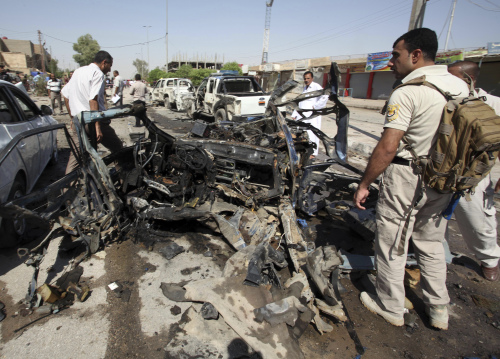Suspicion arises that al-Qaida is behind attacks, despite signs the terror group is weakened
BAGHDAD (AP) ― A relentless barrage of bombings killed 63 people Monday in the most sweeping and coordinated attack Iraq has seen in over a year, striking 17 cities from northern Sunni areas to the southern Shiite heartland.
The surprising scope and sophistication of the bloodbath suggested that al-Qaida remains resilient despite recent signs of weakness. Such attacks, infrequent as they are deadly, will likely continue long after American forces withdraw from the country.
“This is our destiny,” said Eidan Mahdi, one of more than 250 Iraqis wounded Monday. Mahdi was lying in a hospital bed in the southern city of Kut. One of his eyes was closed shut with dried blood, and burns covered his hands and head.
 |
Iraqi security forces inspect the remains of a car used in suicide attack outside a police building on Monday. (AP-Yonhap News) |

While some Iraqis expressed resignation, others voiced fury at security officials and Prime Minister Nouri al-Maliki.
“Where is the government with all these explosions across the country? Where is al-Maliki? Why doesn’t he come to see?” said Ali Jumaa Ziad, a Kut shop owner. Ziad was brushing pieces of human flesh from the floor and off equipment in his shop.
The bombs went off on a hot and sunny morning as people were headed to work. Explosive devices were planted in the vests of suicide attackers, in parked cars, along the sides of roads and even on light poles.
No group immediately claimed responsibility, but the simultaneous attacks, the targeting of Shiite civilians and Iraqi security forces and the use of suicide bombers indicated that al-Qaida in Iraq was responsible.
That the terror group was able to pull off such an attack, spanning half of Iraq’s 18 provinces, came as somewhat of a surprise.
A little over a year ago, U.S. and Iraqi officials said the deaths of al-Qaida in Iraq’s two top leaders in a raid had dealt a severe blow to the organization. The group has suffered from a drop in funding and just last week was calling on former members to come back to the fold, a sign of the group’s diminished status.
But time and again, al-Qaida in Iraq has shown an ability to resurrect itself.
“Al-Qaida in Iraq has been resting and waiting and is now making itself heard to both disrupt the internal Iraqi political process and send a message to the Americans, which have called al-Qaida in Iraq dead and buried,” said Theodore Karasik, a Middle East security expert at the Dubai-based Institute for Near East and Gulf Military Analysis.
Monday’s violence came less than two weeks after Iraqi officials said they would discuss with the U.S. whether to have some American forces stay in the country past their Dec. 31 withdrawal deadline. U.S. officials have offered to keep about 10,000 of the 46,000 American soldiers currently here into next year if Iraq agrees.
Karasik said the timing may be no coincidence, and that al-Qaida may be using reverse psychology. Greater violence could lead to calls for the U.S. to extend its military presence, but the terror group knows that the U.S. is very unlikely to resume a full-scale combat mission and that the troop numbers would be too small to make much of a difference.
“If the U.S. extends its military presence, al-Qaida in Iraq can use it as a tool by saying, ‘Look, the Americans have reversed their decision to leave and are staying on as occupiers.’ They could use this as a justification for more attacks,” Karasik said.
Joost Hiltermann from the International Crisis Group said such attacks are likely to continue regardless of whether the American forces withdraw because the Sunni population from which al-Qaida in Iraq gets its support still feels threatened by the Shiite-led Iraqi government.
“The point is how strong and cohesive the government, the ruling coalition and the security forces are. That is going to determine whether these guys (al-Qaida) have an opportunity or not. You need to dry up their opportunities,” Hiltermann said.
“The Sunnis are still very unhappy with the Maliki government and the role that they play in it,” he added.
President Barack Obama’s spokesman, Jay Carney, said the White House strongly condemned the bombings, but emphasized that overall violence was down.
U.S. State Department spokeswoman Victoria Nuland told reporters in Washington that the U.S. remains concerned about terrorist attacks.
“In net terms, though, overall, the violence in Iraq is significantly down this year over previous years,” she said. “We consider these to be desperate acts by desperate people. We believe that the Iraqi security forces are getting stronger by the day. And our goal is to continue to strengthen them. And we remain on track to withdraw all our forces at the end of the year.”
A U.S. military spokeswoman, Maj. Angela L. Funaro, said Iraq had asked U.S. forces in Tikrit for assistance but that was the only request they received.
Iraqi President Jalal Talabani called the attackers cowards but acknowledged in a statement that faults in the security apparatus were to blame for the violence. Al-Maliki vowed in a statement to hunt down those responsible but provided no explanation for how the violence occurred.









